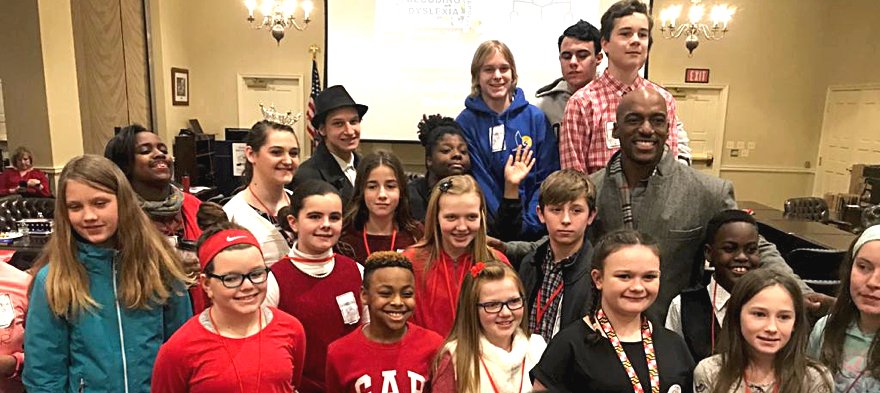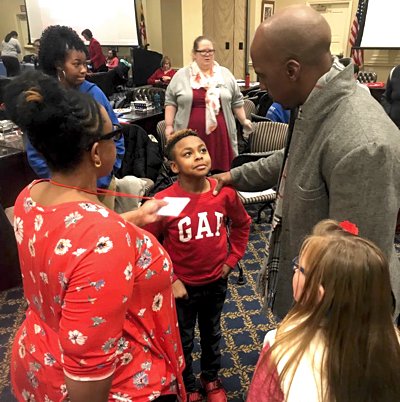
As a young boy, I wasn’t a bad person. I feared going into the classroom because I couldn’t read. Had someone intervened in third or fourth grade, I would never have gone to prison.
Today, by the grace of God, I’m proud to be an Emmy-nominated actor and outspoken advocate for dyslexics like me. But as a child, in New Orleans’ toughest housing project, my reality was very different.
My older brother and sister excelled in school. They would tease me because I couldn’t read. My mother scolded me, calling me “dumb” and “stupid” when I was unable to read well and succeed in school like them.
Perhaps my mother thought she was helping me by practicing “tough love,” but she wasn’t. She was shattering what little self-esteem I had. She was driving me to seek refuge in the streets from peers who were, more often than not, up to no good.
Teachers knew I struggled with reading and spelling, and yet they were completely oblivious to the idea I might have a problem like dyslexia. They seemed to think I was a class clown. I was never pulled aside and asked any questions about why I wasn’t reading.
I think a great, exceptional teacher can really understand which kids are hiding, which kids are ashamed. They can spot them and address them in a way that is pleasant.
I never received that until ninth grade. An English teacher pulled me aside and tried to teach me phonics. But it had just been too long. I was frustrated and bored with school. I was enthralled with the drug life. I had lost hope. I was a teen who became part of the streets-to-prison pipeline.
Dyslexia Sounded Dangerous, But It Meant I Wasn’t Stupid
It wasn’t until I was 23 and behind bars that my dyslexia was diagnosed. When you come into the prison system, you’re screened to find out your reading level. Mine was third grade.
I come from the projects. There is a mentality there that White people are out to get us. Much of this is true, but not all of it. When I share my story, I try to dispel this notion that all White people are bad people.
In prison, I had a White teacher who enjoyed his job. He enjoyed teaching. He told me, “I need you to sit in the front of the class.” I made up my mind I was going to attack this literacy issue.
I wanted to write letters back home. I started writing third-grade, fourth-grade letters, with very small words.
One day, my teacher said, “Ameer, I want you to read something.” I just floundered through it. He said, “I’m going to have someone come in and help you.” A White lady came in and screened me. I didn’t know what screening was. I didn’t know my sounds.
Dyslexia. It sounds terrible, dangerous. It sounded dangerous to me as a young man. Then I found out it meant a reading disability. It’s not me. I’m not “crazy.” I’m not “retarded.” That made me feel good about myself.
I called my mother up and we talked about it. She apologized to me.
In four years in prison, I did not waste time. I studied, read. I went through an online course for 15 months, and it changed my life. I was able to break a word down, spell. It gave me confidence.
Reading liberates you. I don’t care if they have you in prison. I was able to read cowboy books in prison and it freed me. I stayed in the books to escape my reality. Reading afforded me that.
There are so many men in prison who can’t read. They keep going back. They come out, commit crimes and go back again. When you can’t read, you have a distorted view of yourself. That’s why those crimes happen.
Parents and Teachers Can Shatter the Streets-to-Prison Pipeline
I’m grateful that today I have a second chance at life and the opportunity to help others through the Dyslexia Awareness Foundation. Thanks to our partnership with Kansas’ Pittsburg University and Dr. David Hurford, we are launching the world’s largest dyslexia screening and intervention initiative to date.
But I can’t break dyslexia’s streets-to-prison pipeline.

Are you wondering how parents and teachers can prevent the creation of more young people like the juvenile version of me, Ameer Baraka? Are you wanting to identify, nurture and create more young people who can grow into adults like me, someone who is contributing to society and dedicating his life to helping others?
The solution for every parent and every teacher begins with one of the world’s simplest words, a common element of all languages: love.
Parents and teachers can shatter the streets-to-prison pipeline by showing love to struggling readers. They can look for the telltale signs in a young person who demonstrates difficulty in sounding out words, is embarrassed to read aloud in class, hesitates to raise their hand or shows disinterest in reading. Teachers can use new tools like the Shaywitz DyslexiaScreen to identify children at risk.
Today, parents are fighting to ensure their children get the teaching they need to become great readers. Teachers are learning more about the science of reading and how to help all students learn to crack the code of written English.
Most important of all, parents can simply hug a kid and say, “It’s OK, baby. We’re going to work together to make you the best reader you can possibly be.” Teachers can encourage their struggling students privately, saying, “Come see me after class. I’ll help you.”
It all starts with love and encouragement.
Source: Ed Post
